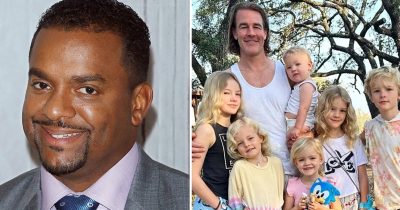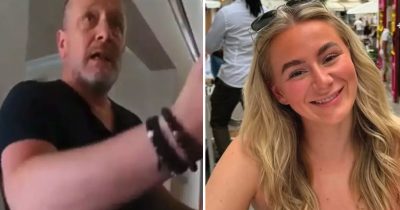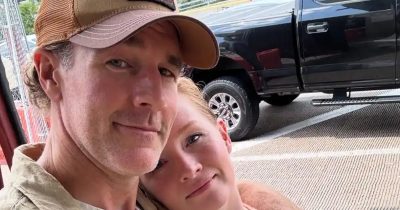
Halloween delivered a lot of tricks for a young Alabama couple who found out that day they were pregnant with quadruplets, that were recently born in March.
Thwarting their plans on celebrating all things ghoulish with their 8-year-old daughter Emily, who loves Halloween, Michael and Hannah Carmack had the biggest scare of their lives when their first pregnancy scan revealed there were two sacks, each with two babies, resting in Hannah’s tummy.
Speaking with the Sand Mountain Reporter, Michael, 32, said, “It was quite a shock. It’s something I’ll never forget.” He continued, “Being that it was Halloween, we had planned to spend the day with our daughter, Emily, and for the day to be all about her. She loves dressing up. But instead, we got quite the surprise.”
Once the initial shock subsided, the couple then learned there were two sets of identical twins, two boys and two girls.
Recalling the moment they found out, Hannah, 29, asked the technician if it was twins. When the tech didn’t respond, Hannah then asked if it was triplets. Finally, the tech spoke and said, “Sweetie, it’s four.”
“All of our emotions hit. Really not knowing what to think and all I could do was put my hands on my head and kind of laugh in disbelief like, is this real?” Michael said in an interview with FOX TV. And as far as Michael and Hannah are aware, there are no other twins in their family, and especially not quadruplets.
“We asked the doctors if quadruplets would run in our family, and they’re like, ‘Quadruplets don’t run in anybody’s family,’” Michael said.
Quadruplets with two sets of twins is very rare. In fact, the Centers for Disease Control and Prevention reports that in 2021, only 331 quadruplets were born out of over 3.6 million total births across the United States.
According to a 2018 study, spontaneous quadruplet pregnancies only occur in somewhere between one in 512,000 to one in 677,000 births. Having two sets of identical twins is even more rare.
The phenomenon happens when two eggs are fertilized at once and then each fertilized egg divides again. According to some medical reports, globally, there are only 72 recorded cases of spontaneous quadruplets, which are quads conceived without fertility treatment.
Doctors told the Carmacks that this was a risky kind of pregnancy and that it’s rare for all the babies to survive. Preparing them for the worst, but hoping for the best, the parents were alerted of the potential complications, including a worst-case scenario of having to choose which babies would live.
“As we were talking to the doctor that day, we went over all the risks that could happen and they told us each baby had a 50 per cent chance of surviving. They offered to terminate some of them so that the others would have a better chance of coming to term,” Michael said. “We told them that we wouldn’t terminate them, that they were a gift given to us.”
Michael said that Baby B, Adeline, the tiniest baby, was struggling in the womb.
“We were having to choose between all or three. Adeline, our smallest baby, really struggled in the womb and had low fluid and had some problems with the flow through her umbilical cord,” he said.
Not willing to give up on any of their babies, the couple was diligent with twice weekly appointments until induced labor on March 14.
A little before 4:30 a.m., Evelyn, David, Daniel and Adeline were delivered safely.
“She’s just a Rockstar…She handled it with incredible grace.” Michael said about his wife.
Since birth, the quads have been in the neonatal intensive care unit (NICU) at UAB Women and Infants Center in Birmingham and are now breathing on their own. The super twins will stay in NICU until their technical due date in June.
Emily, Michael says, is excited to bring her siblings home, which is currently being renovated to make room for the now large family.

Hannah, a vet technician and Michael, who works in the ministry, set up GoFundMe page to help with rapidly increasing expenses.
“I would always recommend that people just be able to reach out to other people in humility, because sometimes asking for help, it’s humbling. Don’t let pride get in the way…it’s OK that it’s hard,” Michael said.
On May 14, celebrating Mother’s Day and the quad’s two-month birthdays, Hannah posted on Facebook, “It’s been 32 days since I last held all my babies together, and let me tell you…it has felt like eternity to me. I cannot wait until I can to do this whenever I want to. We are getting so much closer to having some of our babies home.”
Though it is very rare, the Carmacks aren’t the first to conceive quadruplets without fertility treatments.
In July 2022, Massachusetts’ Ashley Ness safely delivered quadruplets, two sets of twins, two boys and two girls.
Speaking with People about super twins, Dr. Ahmet Baschat, director of the Center for Fetal Therapy and a professor in the Johns Hopkins Medicine Department of Gynecology and Obstetrics, said it’s a rarity of “like 1 in 10 million.”
“If she were playing the lottery, if she’s this lucky, she would be very rich,” said Baschat, who wasn’t involved in Ness’ care.
On February 22, 2023, “Miss Chesley,” as her mom Ashley Ness called her, died at seven months. Chesley, the smallest of the quad was just 1 pound and 7 ounces when she was born and had severe chronic lung disease.
Ness wrote a heartfelt tribute to her sweet daughter, “My poor baby girl was extremely tired and struggling and it was the hardest thing I ever had to watch…She truly was an amazing little girl and forever changed the way I look at things. She did exactly what she was sent to do and that was to touch everyone she met in her short but meaningful life!”
Ness’ other three babies are at home and are happy and healthy.
It’s terribly sad that Ashley Ness lost Miss. Chesley and our thoughts are with her and her family.
Congratulations to the Carmacks on expanding your family by four! We hope all four return home soon and we look forward to watching them grow!




